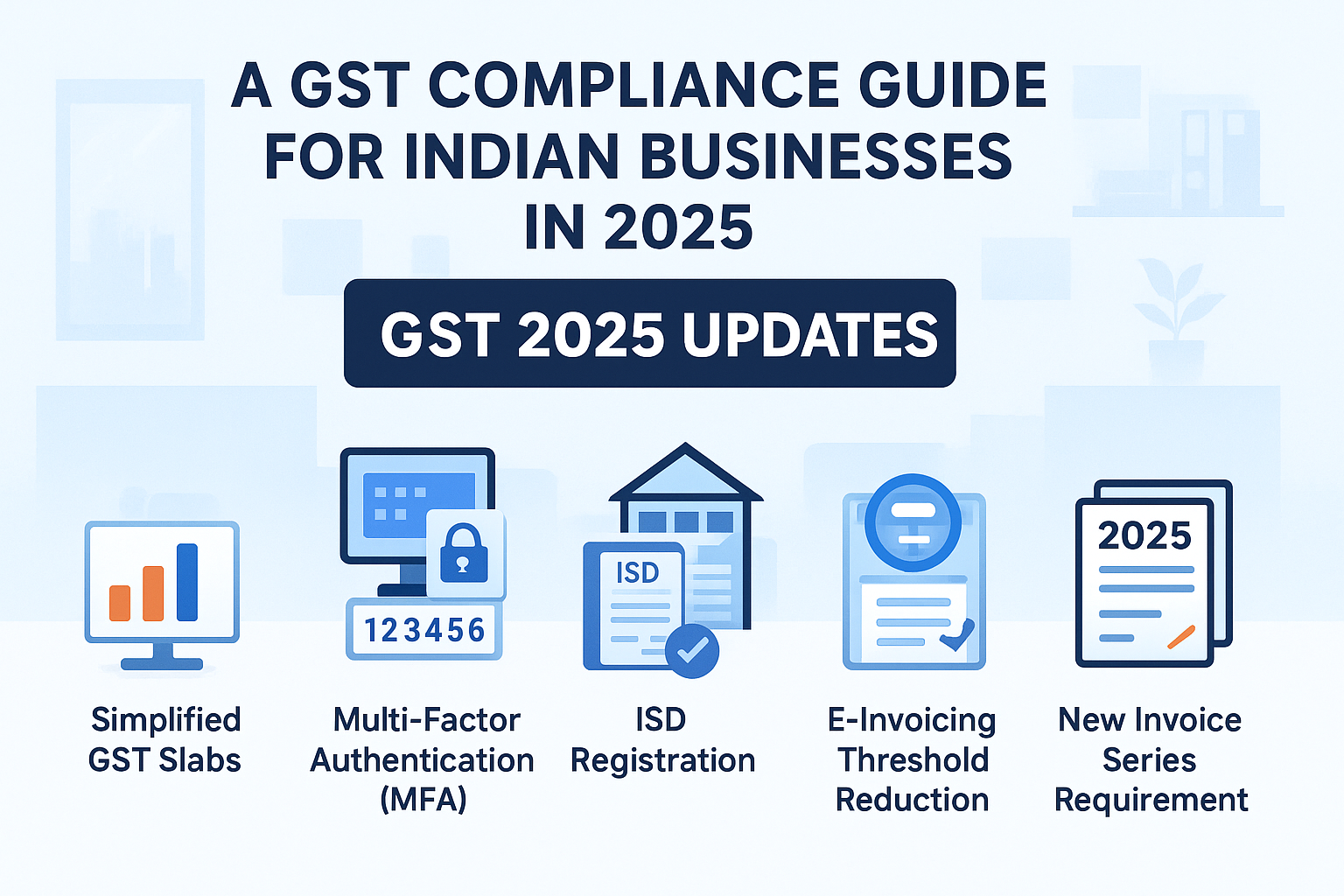2025's GST reforms are on the horizon. Ready your business. This article details the important updates and provides a straightforward list to ensure seamless compliance and operational efficiency. The key takeaway? Your GST billing software needs to be at the heart of your preparation.
Main GST Compliance Changes in 2025
1. Simplified GST Slabs
The GST structure has been streamlined into two primary slabs:
● 5%: Applicable to essential goods and services.
● 18%: Applicable to standard goods and services.
Additionally, a 40% tax has been levied on luxuries and luxury goods, including pan masala, tobacco, carbonated beverages, expensive cars, yachts, and private planes, to provide equality and balance of income (Press Information Bureau).
2. Compulsory Multi-Factor Authentication (MFA)
Due to high risk, all taxpayers must implement multi-factor authentication to access the GST portal beginning April 1, 2025, to enhance security and reduce fraudulent activity (India Briefing).
3. Input Service Distributor (ISD) Registration
The ISD mechanism, previously optional, has become mandatory. Businesses with multiple locations must now obtain ISD registration to distribute Input Tax Credit (ITC) for services received centrally. (Cygnet One)
4. E-Invoicing Threshold Reduction
The turnover for mandatory e-invoicing has been lowered to ₹1 crore, requiring more businesses to adopt electronic invoicing to streamline processes and enhance compliance (India Briefing).
5. New Invoice Series Requirement
From April 1, 2025, all registered taxpayers must start a fresh invoice series. aligning with statutory invoicing norms.
Best Practices for GST Compliance in 20251.
1. Correct and On-Time TAX Return Submission
File on Time: Get your GSTR-3B in by the 21st of the next month. No exceptions.
Reconcile with Precision: Ensure every detail in your GSTR-1 perfectly matches your GSTR-3B.
The Foundation: Powerful compliance is built on a solid bedrock of well-kept sales and purchase records.
2. Frequent GST Reconciliation
● Monthly GSTR-2B reconciliation with purchase records.
● Quickly correct discrepancies to avoid fines and interest.
3. Put Technology Solutions into Practice
Use accounting and billing software that complies with GST to automate procedures. Reduce manual errors by using e-invoicing, return filing, and reconciliation tools.
4. Monitor Compliance Rating
The GST compliance rating system evaluates businesses based on:
● Timeliness of return filings.
● Accuracy of ITC claims.
● Error-free records and reconciliation.
A higher rating can enhance business reputation and facilitate smoother operations (proanalyser.in).
5. Make Learning a Habit
● Keep an eye on official sources like the GST Council.
● Join a workshop now and then to keep your knowledge fresh and relevant.
Disadvantages of Non-Compliance
Failure to follow GST regulations can lead to:
● Penalties and Interest: For late filings and incorrect ITC claims.
● Frozen Input Tax Credit: Blocking of ITC can disrupt cash flow.
● Audit Scrutiny: Increased likelihood of audits and investigations.
● Reputation Damage: Loss of trust among vendors and customers.
Conclusion
Unlock Your Business's Potential in FY 2025!
The highest standard of business is not just to follow the law, but to uphold its spirit.
Mastering GST through diligent practice and modern tools is a dual responsibility: it ensures our own operational integrity while simultaneously strengthening the economic fabric of our nation. This is the true reward of compliance.
FAQs
Q1: What's the due date for the GSTR-3B?
It's due by the 21st of the subsequent month after the tax month (effective from July 2025).
Q2: Does my business need to use e-invoicing?
Think of it like a threshold. If your annual sales cross ₹1 crore, then yes, e-invoicing is a must for you.
Q3: How can I get a top-grade GST compliance score?
It's like building a good habit! The recipe is simple:Be Punctual: Always file your returns on or before the due date. Be Accurate: Double-check your purchase details to avoid ITC mismatches. Be Smart: Use good GST software—it’s your best helper for avoiding errors.
Q4: What if I make a mistake or miss a deadline?
It's more than just a fine. You could lose the money you save on taxes (ITC), and in serious cases, the government can deactivate your GST number. Without it, you can't legally run your business.
Q5: Where do I stay updated regarding GST?
Regularly check the official GST Council and GSTN (GSTN) websites, where they will post regular updates.

